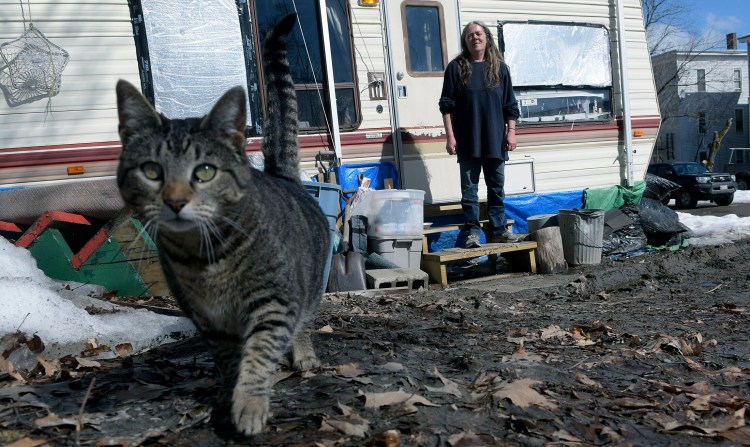AUGUSTA — City officials plan to work on a proposal to limit how long someone can live in a camper.
Ward 3 City Councilor Harold Elliott will work with city staff to draft a proposal that would regulate the use of campers in Augusta, and restrict how long someone could live in them. The plan was prompted by the concerns of a Boothby Street apartment building owner that potential tenants for his under-renovation building could be put off by the appearance of two campers sitting in the backyard of adjacent properties to his, and that people are living in them.
Augusta has no prohibition on how long a person may live in a camper, as long as the recreational vehicle owner is managing their waste appropriately and has permission from the owner of the property where it is parked to be there, according to Development Director Matt Nazar.
Jason Coombs, who said he bought 11 Boothby St. two years ago and has put some $90,000 in renovations into it, said there is someone living in at least one of two camper trailers in the backyard of his neighbors, which he is concerned could prompt potential tenants to decide the neighborhood would be an undesirable place to live.
City councilors expressed sympathy for Coombs and said the city would look into a solution. However, councilors said a time limit on how long someone can live in a camper might not be the best solution and could have unintended consequences, including potentially leaving someone who can’t afford somewhere else to live without their home.
“I wonder if there is a better way to address these concerns, because they’re valid,” said Ward 2 Councilor Kevin Judkins. “But I’m hesitant to tell somebody they can’t live in a camper, if that’s what they have. Being in a shelter is better than being on the street. And being in a camper may be an upgrade from being in a shelter.”

Lana Stafford hugs her cat outside the camper in which she resides in Augusta. The Augusta City Council discussed regulating how long people can live in campers in the city at its meeting Thursday night. Kennebec Journal photo by Andy Molloy
Lana Stafford, who lives in an approximately 32-foot-long camper that serves as her yearround home parked on a piece of property on Boothby Street, said she doesn’t know what she’s going to do if the city limits the amount of time people can stay in campers. It wasn’t clear, Thursday night, whether her camper was the one which prompted Coombs’ concerns.
Stafford said she lives in the camper because it’s all she can afford. Her only income is food stamps, and she has mental health problems that sometimes make it impossible to be around other people, such as she would be living in an apartment building with other tenants.

Lana Stafford on Thursday outside the camper in which she resides in Augusta. The Augusta City Council discussed regulating how long people can live in campers in the city at its meeting Thursday night. Kennebec Journal photo by Andy Molloy
“Here, I have no upstairs neighbors, no downstairs neighbors, no sideways neighbors,” Stafford said in an interview before Thursday’s meeting. “It lets me exist. I just don’t know what I’m going to do. It would put me right out.”
She said she wanted speak against the proposal but wasn’t sure she’d be able to go to Thursday’s council meeting.
She lives in her camper with her cat, “Mumma’s Girl,” on a property owned by a friend who she said let’s her stay there. She said she helps the friend by keeping an eye on the property.
She lives yearround in part of the camper, a 1980s model she said her son got for her last year, living in one section of it so it costs less to heat, with a small monitor heater. She said the camper has a bathroom in it with a holding tank that, when full, she takes to the Greater Augusta Utility District to empty.
She said she’s not hurting anyone by living in her camper, and none of her neighbors have complained to her about it. She said she’s had a camper on the property for about eight years, though she didn’t always live in it yearround, as she has for the last couple of years.
Mayor David Rollins said there are safety concerns with people living in campers yearround, both due to the need to heat them and because campers aren’t built with the intent they be lived in every day. He also said it’s always cause for concern when someone is doing something that impacts the value of someone else’s property.
He suggested rules for campers in the city could be different based upon which zone the property is located. He said an occupied camper in the urban part of the city, close to neighboring buildings, could be a problem, but one in a rural area of the city, on the back of someone’s property where no one would see it, may be fine.
Some municipalities limit how much time people can reside in campers. The city of Bangor, for example, limits the period of time someone can occupy a camper in the city to 30 days total within a 12-month period.
In a memo to City Manager William Bridgeo, however, Nazar warned that rules that restrict living in a camper to too short of a time period could be problematic to numerous people who stay in their campers for longer periods of time in Augusta. This includes people who have property on local lakes who stay in their RVs for the summer, sometimes where the owner has installed a concrete pad with a septic system and well hookup for their RV. Others could be people who have family come visit for long periods of time and stay in a camper in their yard.
Keith Edwards — 621-5647
kedwards@centralmaine.com
Twitter: @kedwardskj
Send questions/comments to the editors.



